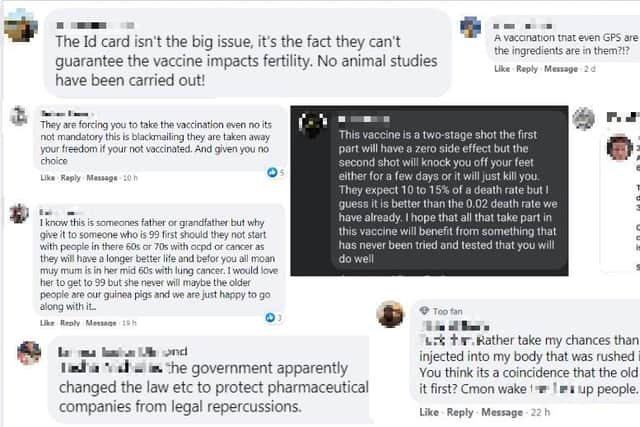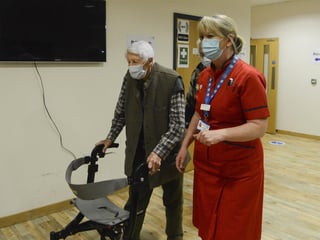University of Portsmouth scientist debunks coronavirus vaccine conspiracies and answers your concerns
and live on Freeview channel 276
Research by King’s College London and Ipsos MORI, has shown that one in three people in the UK say they’ve seen or heard messages discouraging the public from getting a coronavirus vaccine, and anti-vax voices are using social media to amplify their messages,
So we asked Dr Simon Kolstoe, who is a senior lecturer in evidence-based Healthcare at the University of Portsmouth, to debunk the conspiracies, inform those with concerns and share his knowledge of health research.
1) Rather take my chance than have something injected into my body that was rushed into production. You think it’s a coincidence that old folks are getting it first?


Advertisement
Hide AdAdvertisement
Hide AdIt makes sense to be hesitant about receiving an injection because it is introducing a foreign substance into your body. However, the regulatory process is extremely robust, and it is quite difficult for any medicine or vaccine to get permission to be used with patients.
It is understandable to worry that the Covid-19 vaccines have been rushed, but the truth is that the new vaccines are based on technology that has taken many years to be developed.
Even the ‘novel’ vaccines such as the Pfizer/BioNTech vaccine is based on science that has taken many years, and many people, to develop to the point where it can be used to make the vaccine.
Although the vaccine is new, the science certainly is not.


Finally, it is worth noting that most of the time saving has been accomplished by having a tremendous amount of funding and people available to work on Covid-19 projects. The reason why it normally takes much longer to develop a vaccine is because a lot of time is spent fundraising, writing grants, waiting for permissions etc.
Advertisement
Hide AdAdvertisement
Hide AdMost of this ‘dead time’ was removed from the Covid-19 vaccine development projects. But even so, it takes about a year to develop the seasonal flu vaccine - a timeframe that is not dissimilar.
2) They are forcing you to take the vaccination even though it’s not mandatory. This is blackmailing – they are taking away your freedom if you’re not vaccinated.
There is an old saying ‘with freedom comes responsibility’. I may be free to spend my own money, but I also have a responsibility to feed, clothe and house my family. I may be free to go to the pub, but I have the responsibility to pay for my beer and behave appropriately. It turns out that almost every freedom that we enjoy comes with related responsibilities.
It is very unlikely that vaccination will be made compulsory in the UK. However, the restrictions on our lifestyles will only be reduced as the Covid-19 cases reduce, and this will only happen if a significant proportion of the population gets vaccinated.
Each of us has the freedom to decide whether we will be part of the solution, but also the responsibility to live with the consequences of that decision.
3) A vaccination that even GPs are not allowed to ask what ingredients are in them?!?
Advertisement
Hide AdAdvertisement
Hide AdThis isn’t true. You can easily find the ingredients to most vaccines online, and it is also relatively easy to track down original patents and clinical trial registrations using just normal search engines.
What isn’t easy is understanding these documents. There is also a vast number of academic and scientific papers written about the ingredients (components) of vaccines, but again you need to be familiar with quite a lot of complex science to understand the discussions.
This is a reflection of the complexity of science and the human body, not an attempt to cover something up.
4) It is the fact they can’t guarantee the vaccine [doesn’t] impact fertility.
It is quite usual not to know the long-term side-effects when something new has been developed or built.
Advertisement
Hide AdAdvertisement
Hide AdMost new houses, cars and many other technologies turn out to have unforeseen problems or issues further down the line that require a bit of tweaking to solve.
However, the hope is that over time experts learn from previous experience and ensure that new technologies avoid problems that have occurred in the past. Medicines and vaccines are similar to other technologies in this regard, but because they are technologies that have an impact on our health, the lessons of the past are carefully catalogued and built into the strict regulatory process.
Yes of course something new might come up, especially when a medicine is given to a lot of people, but such new things are often very rare simply because we already know how to design medicines in such a way as to avoid the main safety problems that could occur.
One example is the recent advice that people with a history of severe allergy avoid the Pfizer/BioNTech vaccine. An anaphylactoid reaction is well known side effect whenever anything is injected into the body, which is the reason why pharmacists and nurses always ask you to wait a few minutes following any injection.
Advertisement
Hide AdAdvertisement
Hide AdWe know from previous experience it will happen to a certain (small) proportion of the population, so safety measures are put in place for this well understood reaction.
5) The vaccine is a two-stage shot. The first part will have a zero side-effect but the second shot will knock you off your feet either for a few days or it will just kill you.
The reason why many of us in this country carry umbrellas is because we often encounter rain and so like to be prepared.
People in drier countries do not often carry umbrellas because they do not often encounter rain, and instead may simply run for cover if it does rain.
If exposed to a single dose of some vaccines the body will mount a response, but it is a bit like running for cover from a sudden rain storm. The strategy works, but is not a long-term solution. However, if the body encounters the same vaccine a second or third time it will ‘remember’ the previous experience and subsequently become better prepared.
Advertisement
Hide AdAdvertisement
Hide AdIt is the equivalent of remembering to bring an umbrella if you often encounter rain.
Regarding the risk of death, occasionally very dangerous medications are approved, but only if the disease they are treating (often very severe forms of cancer) is likely to kill the patient significantly earlier than the medication will.
Vaccines do not fall into this category because it is possible (although not always easy) to simply avoid the diseases that vaccines are aimed to prevent and thus still live a very long time.
6) The government apparently changed the law to protect pharmaceutical companies from legal repercussions
It is true that legal changes have been made to facilitate the roll out of vaccinations, however this will not protect pharmaceutical companies from prosecution.
Advertisement
Hide AdAdvertisement
Hide AdThe legal profession is creative and mercenary, so if they get a sniff that something untoward has happened there will soon be a flurry of lawsuits.
Of course the pharmaceutical companies know this, especially given the high profile of Covid-19 vaccines, and thus are more likely to co-operate with regulators and the medical profession to ensure that they do not get caught out.
7) 32.7m people have died of HIV/AIDS in the last 35 years. 690,000 died in 2019 alone.
There is no vaccine for HIV/AIDS despite best efforts over those 35 years. Covid though?
Six months and three companies have a vaccine which is 90 per cent effective. Sound plausible?
HIV/AIDS is a very different kind of condition, that also arose a long time ago in terms of medical science. There are now extremely good (albeit expensive) treatments for HIV/AIDS, but comparing HIV to SARS-CoV-2 (these are the viruses) and AIDS to COVID-19 (these are the diseases caused by the viruses) is a bit like comparing the problem of a flat tyre on a car (Covid-19) with a rusty chassis (AIDS).
The two problems are very different and require very different solutions.
SEE ALSO: Latest announced Covid case numbers for Hampshire including Portsmouth, Fareham, Gosport and Havant
8) Why give it to someone who is 99 first? Should they not start with people in their 60s or 70s with COPD or cancer and they will have a longer better life.
Advertisement
Hide AdAdvertisement
Hide AdIt is true that the risk of severe complications increases with age, and thus the people most likely to benefit from an effective vaccine will be older.
The choice of a 99-year-old did, however, feel like a bit of a publicity stunt, but all the statistics tell us that this individual was more at risk than people in their 60s or 70s regardless of other underlying conditions.
Just looking at the people who are hospitalised and subsequently die with this virus explains why the older you are, the more important it is to be vaccinated as soon as possible.
Dr Kolstoe started his career with a PhD in Biochemistry and ten years working in biomedical research before moving into the philosophy and ethics of medicine.
Advertisement
Hide AdAdvertisement
Hide AdHe writes and lectures internationally on the importance of good research to healthcare.
A message from the Editor, Mark Waldron
The News is more reliant than ever on you taking out a digital subscription to support our journalism.
You can subscribe here for unlimited access to Portsmouth news online - as well as our new Puzzles section.
Comment Guidelines
National World encourages reader discussion on our stories. User feedback, insights and back-and-forth exchanges add a rich layer of context to reporting. Please review our Community Guidelines before commenting.
